
Think Again: Are Education Programs for High Achievers Inherently Inequitable?
This brief challenges the notion that marginalized students of high ability are harmed by advanced education, with implications for better screening measures and expansion of programs.
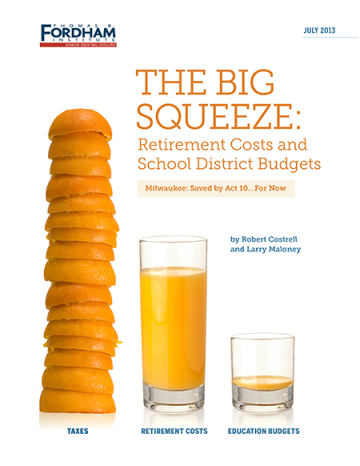
Milwaukee: Saved by Act 10...For Now
One of three technical reports on retirement costs and school-district budgets.
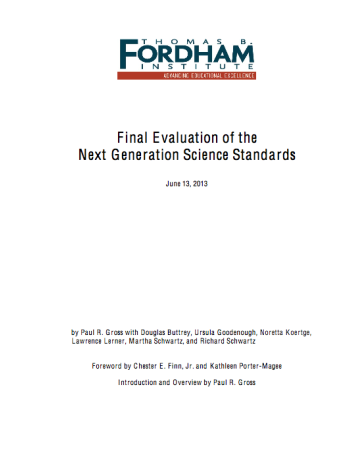
Final Evaluation of the Next Generation Science Standards
In the final evaluation of the Next Generation Science Standards (NGSS), the Thomas B. Fordham Institute grants the standards a C grade. The NGSS grade is superior to grades we granted to the science standards of sixteen states and the PISA framework in the State of State Science Standards 2012 but inferior to those of twelve states and the District of Columbia, as well as the NAEP and TIMSS frameworks.
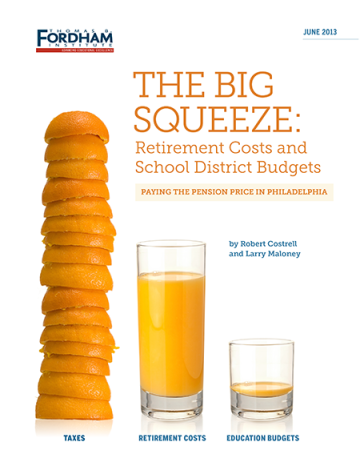
Paying the Pension Price in Philadelphia
One of three technical reports on retirement costs and school-district budgets.
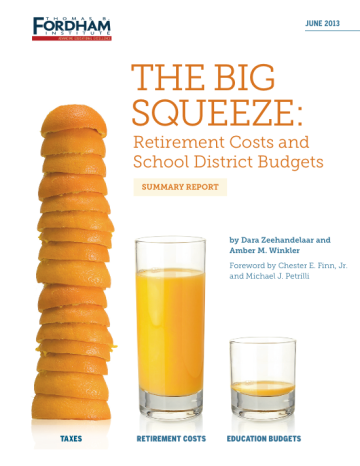
The Big Squeeze: Retirement Costs and School-District Budgets
When it comes to pension reform in the education realm, it’s hard to stay positive. Here, we’re saddled with a bona fide fiscal calamity (up to a trillion dollars in unfunded liabilities by some counts), and no consensus about how to rectify the situation. No matter how one slices and dices this problem, somebody ends up paying in ways they won’t like and perhaps shouldn’t have to bear. All we can say is that some options are less bad than others.

Redefining the School District in Tennessee
As the challenges of education governance loom ever larger and the dysfunction and incapacity of the traditional K-12 system reveal themselves as major roadblocks to urgently-needed reforms across that system, many have asked, “What’s the alternative?”
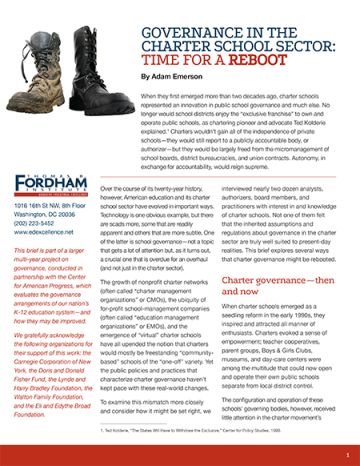
Governance in the charter school sector: Time for a reboot
When charter schools first emerged more than two decades ago, they presented an innovation in public school governance. No longer would school districts enjoy the “exclusive franchise” to own and operate public schools, as chartering pioneer and advocate Ted Kolderie explained. Charters wouldn’t gain all of the independence of private schools—they would still report to a publicly accountable body, or authorizer—but they would be largely freed from the micromanagement of school boards, district bureaucracies, and union contracts. Autonomy, in exchange for accountability, would reign supreme.
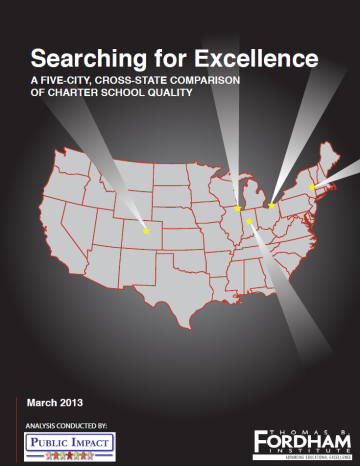
Searching for Excellence: A Five-City, Cross-State Comparison of Charter School Quality
Conducted jointly by the Thomas B. Fordham Institute and Public Impact, the new research study Searching for Excellence: A Five-City, Cross-State Comparison of Charter School Quality sheds light on charter performance — in Albany, Chicago, Cleveland, Denver, and Indianapolis. These cities were highlighted because they have relatively large numbers of charter schools and charter school students. These are cities where charters have been part of the educational landscape for a decade or more. Read this exciting report today!
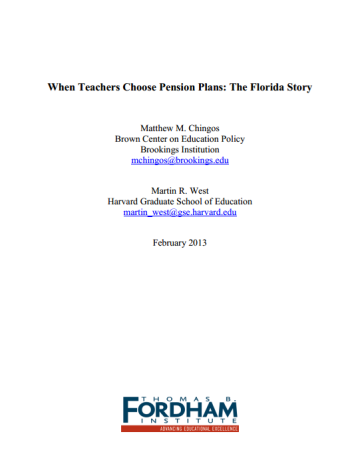
When Teachers Choose Pension Plans: The Florida Story
In an era of budgetary belt tightening, state and local policy makers are finally awakening to the impact of teacher pension costs on their bottom lines. Recent reports demonstrate that such pension programs across the United States are burdened by almost $390 billion in unfunded liabilities. Yet, most states and municipalities have been taking the road of least resistance, tinkering around the edges rather than tackling systemic (but painful) pension reform. Is the solution to the pension crisis to offer teachers the option of a 401(k)-style plan (also known as a "defined contribution" or DC plan) instead of a traditional pension plan? Would this alternative appeal to teachers? When Teachers Choose Pension Plans: The Florida Story sets out to answer these questions.
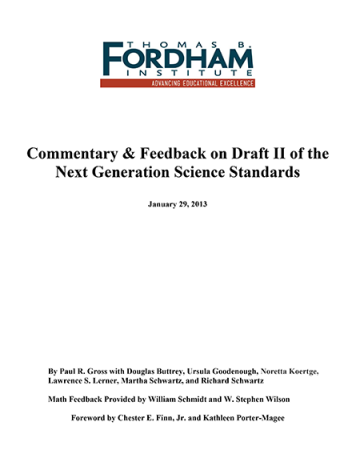
Commentary & Feedback on Draft II of the Next Generation Science Standards
The Thomas B. Fordham Institute has provided big-picture feedback and detailed, standard-specific commentary for the second draft of the Next Generation Science Standards—standards that done right, set a firm foundation upon which the rest of science education across the states will be constructed. In our comments on the first draft, we concluded that “the NGSS authors have much to do to ensure that the final draft is a true leap forward in science education.” In comments on Draft II, we address to what extent NGSS writers have moved closer to a set of K–12 science standards that even states with strong standards of their own would do well to adopt.
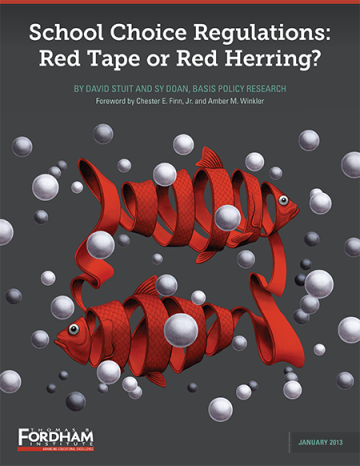
School Choice Regulations: Red Tape or Red Herring?
Many proponents of private school choice take for granted that schools won’t participate if government asks too much of them, especially if it demands that they be publicly accountable for student achievement. Were such school refusals to be widespread, the programs themselves could not serve many kids. But is this assumption justified? A new Fordham Institute study—to be released on January 29—provides empirical answers. Do regulations and accountability requirements deter private schools from participating in choice programs? How important are such requirements compared to other factors, such as voucher amounts? Are certain types of regulations stronger deterrents than others? Do certain types schools shy away from regulation more than others?
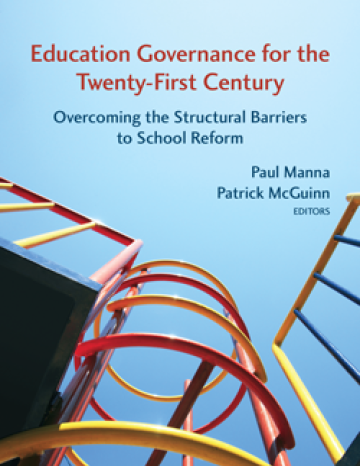
Education Governance for the Twenty-First Century: Overcoming the Structural Barriers to School Reform
America’s fragmented, decentralized, politicized, and bureaucratic system of education governance is a major impediment to school reform. In Education Governance for the Twenty-First Century: Overcoming the Structural Barriers to School Reform, a number of leading education scholars, analysts, and practitioners show that understanding the impact of specific policy changes in areas such as standards, testing, teachers, or school choice requires careful analysis of the broader governing arrangements that influence their content, implementation, and impact.
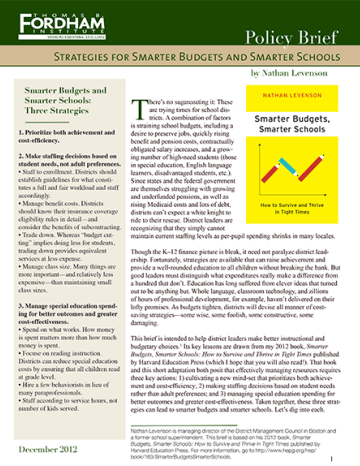
Strategies for Smarter Budgets and Smarter Schools
This new policy brief by Nathan Levenson, Managing Director at the District Management Council and former superintendent of Arlington (MA) Public Schools, offers informed advice to school districts seeking to provide a well-rounded, quality education to all children in a time of strained budgets. Levenson recommends three strategies: prioritize both achievement and cost-efficiency; make staffing decisions based on student needs, not student preferences; and manage special-education spending for better outcomes and greater cost-effectiveness.